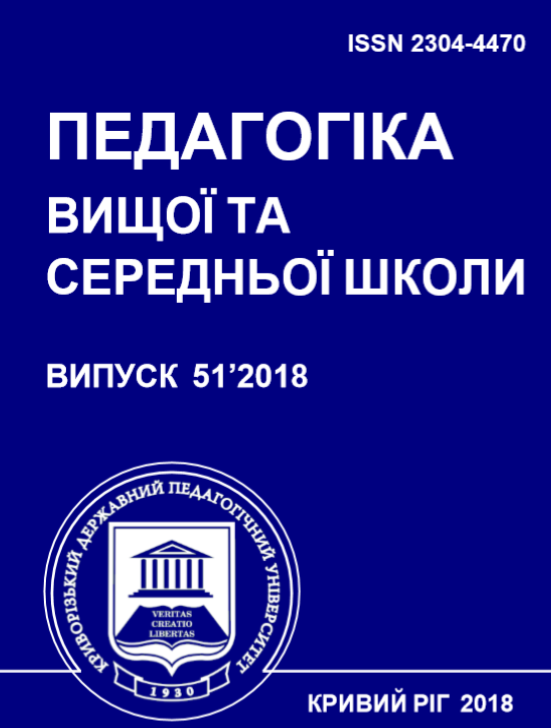Vol. 51 (2018)
 In this issue:
In this issue:
- Title page
- Summary
- Contents
- Using ICT as the Tools of Forming the Senior Pupils’ Research Competencies in the Profile Chemistry Learning of Elective Course “Basics of Quantitative Chemical Analysis
- Use of Augmented Reality in Chemistry Education
- Computer Simulation of Biological Processes at the High School
- Augmented Reality Tools in Physics Training at Higher Technical Educational Institutions
- Developing of Key Competencies by Means of Augmented Reality at CLIL Lessons
- Implementation of Gamification and Elements of Augmented Reality During the Binary Lessons in a Secondary School
- The Problems of Personnel Training for STEM Education in the Modern Innovative Learning and Research Environment
- The Potential of Using Google Expeditions and Google Lens Tools under STEM-education in Ukraine
- Structuring Augmented Reality Information on the stemua.science
- Prospects of Using the Augmented Reality for Training Foreign Students at the Preparatory Departments of Universities in Ukraine
- Conceptual Bases of Use of Free Software in the Professional Training of Pre-Service Teacher of Mathematics, Physics and Computer Science
- The Model of Use of Mobile Information and Communication Technologies in Learning Computer Sciences to Future Professionals in Engineering Pedagogy
- Stages of Conceptualization and Formalization in the Design of the Model of the Neuro-Fuzzy Expert System of Professional Selection of Pupils
- Computer Simulation of Neural Networks Using Spreadsheets: The Dawn of the Age of Camelot
- Modernization of Professional Training of Electromechanics Bachelors: ICT-based Competence Approach
- Usage of E-learning Tools in Self-education of Government Officers Involved in Global Trade Activities
- Google Classroom as a Tool of Support of Blended Learning for Geography Students
- Augmented Reality and the Prospects for Applying Its in the Training of Future Engineers
- Defining the Structure of Environmental Competence of Future Mining Engineers: ICT Approach
- Investigation of Opportunities of the Practical Application of the Augmented Reality Technologies in the Information and Educative Environment for Mining Engineers Training in the Higher Education Establishment
- Automation of the Export Data from Open Journal Systems to the Russian Science Citation Index
- Augmented Reality: Ukrainian Present Business and Future Education
- The Cloud Technologies and Augmented Reality: the Prospects of Use
- Using the Augmented Reality to Teach of Global Reading of Preschoolers with Autism Spectrum Disorders
- Incoming data
Published:
13-12-2018
-
Title page
- PDF (Українська) Abstract views 118 / PDF downloads 69
-
Summary
- PDF (Українська) Abstract views 144 / PDF downloads 53
-
Use of Augmented Reality in Chemistry Education
- PDF Abstract views 363 / PDF downloads 177
-
Computer Simulation of Biological Processes at the High School
- PDF Abstract views 206 / PDF downloads 85
-
Augmented Reality Tools in Physics Training at Higher Technical Educational Institutions
- PDF Abstract views 303 / PDF downloads 112
-
Developing of Key Competencies by Means of Augmented Reality at CLIL Lessons
- PDF Abstract views 288 / PDF downloads 123
-
Implementation of Gamification and Elements of Augmented Reality During the Binary Lessons in a Secondary School
- PDF Abstract views 703 / PDF downloads 310
-
The Problems of Personnel Training for STEM Education in the Modern Innovative Learning and Research Environment
- PDF Abstract views 202 / PDF downloads 78
-
The Potential of Using Google Expeditions and Google Lens Tools under STEM-education in Ukraine
- PDF Abstract views 361 / PDF downloads 204
-
Structuring Augmented Reality Information on the stemua.science
- PDF Abstract views 314 / PDF downloads 171
-
Prospects of Using the Augmented Reality for Training Foreign Students at the Preparatory Departments of Universities in Ukraine
- PDF Abstract views 305 / PDF downloads 123
-
Conceptual Bases of Use of Free Software in the Professional Training of Pre-Service Teacher of Mathematics, Physics and Computer Science
- PDF Abstract views 278 / PDF downloads 142
-
Computer Simulation of Neural Networks Using Spreadsheets: The Dawn of the Age of Camelot
- PDF Abstract views 226 / PDF downloads 79
-
Modernization of Professional Training of Electromechanics Bachelors: ICT-based Competence Approach
- PDF Abstract views 203 / PDF downloads 192
-
Usage of E-learning Tools in Self-education of Government Officers Involved in Global Trade Activities
- PDF Abstract views 219 / PDF downloads 71
-
Google Classroom as a Tool of Support of Blended Learning for Geography Students
- PDF Abstract views 387 / PDF downloads 122
-
Augmented Reality and the Prospects for Applying Its in the Training of Future Engineers
- PDF Abstract views 259 / PDF downloads 112
-
Defining the Structure of Environmental Competence of Future Mining Engineers: ICT Approach
- PDF Abstract views 211 / PDF downloads 75
-
Automation of the Export Data from Open Journal Systems to the Russian Science Citation Index
- PDF Abstract views 217 / PDF downloads 73
-
Augmented Reality: Ukrainian Present Business and Future Education
- PDF Abstract views 249 / PDF downloads 115
-
The Cloud Technologies and Augmented Reality: the Prospects of Use
- PDF Abstract views 220 / PDF downloads 88
-
Using the Augmented Reality to Teach of Global Reading of Preschoolers with Autism Spectrum Disorders
- PDF Abstract views 889 / PDF downloads 448
-
Incoming data
- PDF (Українська) Abstract views 96 / PDF downloads 53




